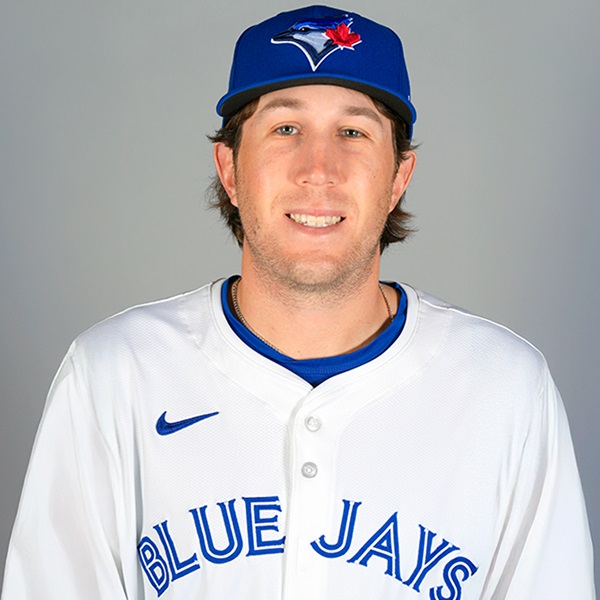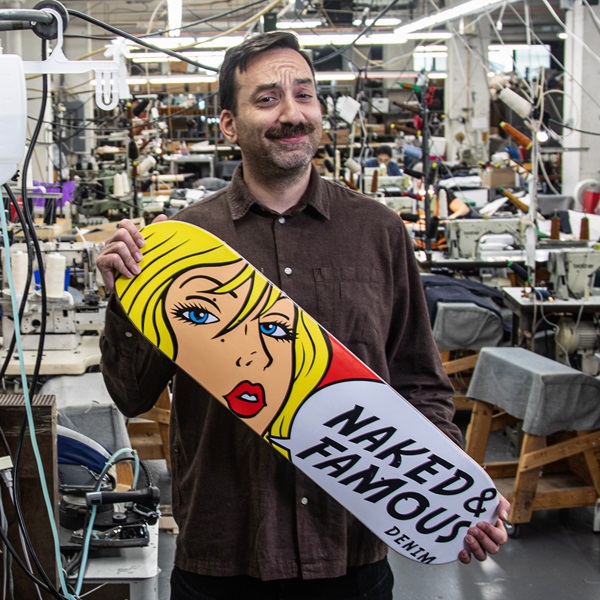It wasn’t the first time that Sam Greene celebrated a big baseball victory. During his McGill studies, he was a pitcher for the McGill Redbirds, helping that team win three national championships in four years.
What’s been going on in Toronto lately has been on a somewhat larger scale.
Greene, BCom’20, MMgmt’21, is the assistant pitching coach for the Toronto Blue Jays and has played a key supporting role during the team’s remarkable season.
He was on the scene when the Rogers Centre erupted in joy as the Jays clinched their first divisional title in 10 years, launching a playoff run that has captivated the country. After vanquishing the New York Yankees in their first post-season series, the team hopes to win the American League Championship and move on to the World Series.
“It’s been a dream come true, and I feel incredibly lucky to be a part of this,” says Greene. “This team is really special, and I think we all sensed that on day one of spring training. This group – the position players, the pitchers, everybody in the clubhouse, the staff – everybody here pulls together. It is a super-tight group.”
Greene has been a part of the Blue Jays organization since 2021 when he was first hired as an intern in the research and development department. A graduate of the Desautels Faculty of Management’s Master of Management in Analytics program, he has brought his data-probing skillset to the Jays in a variety of roles.
He earned a promotion before the start of this season and began working directly with the team’s pitchers, using his analytics expertise to offer suggestions on how to deal with opposing batters.
“To see the grind of a 162-game season on a day-to-day basis has really opened my eyes to how tough that journey is,”
Sam Greene, assistant pitching coach for the Toronto Blue Jays
“We have a lot of people behind the scenes who collect a ton of information and make it digestible,” says Greene. “It makes it easy for us on the coaching staff to translate that to the players and we do our own analysis too. You want to know what your pitchers’ strengths are, and you want to know where the [opposing team’s] hitters will have certain holes or weaknesses. It’s a combination of those two things.”
If a particular batter is especially vulnerable to a fastball thrown to the upper inside corner of the strike zone, for instance, that’s very useful information for a pitcher to have.
Greene spoke to the McGill News while the Jays were waiting to see whether they would be facing the New York Yankees or the Boston Red Sox in the American League Division Series.
“We’ll be sitting down with the pitchers and going over how each of them might want to attack [Yankees star] Aaron Judge, or [Red Sox outfielder] Masataka Yoshida, or anyone in those lineups, so that when they go out there, they’ll feel that they’re prepared to give themselves the best chance to get their jobs done,” says Greene. “We’re talking to the catchers too, because the catchers call the game.”
Greene is from Philadelphia, and he was initially eyeing American universities with top baseball programs for his studies. His mother, a McGill graduate originally from the Quebec town of Thetford Mines, put in a good word for her alma mater – more than once.
“She was a big part of that decision,” says Greene. “We went to Montreal for a visit and I kind of fell in love with it. I met with the [Redbirds] team while I was there. It felt like a great opportunity to play [baseball] and get a good education.”
The Desautels master’s program in analytics held special appeal as Greene knew he wanted to pursue a career in that field with a professional sports team.
“I knew that’s what I wanted to do, but I didn’t feel my skills were sharp enough [before doing the master’s degree],” says Greene. “There are a ton of really smart people applying for these types of jobs. I feel like I really honed my skills at McGill.”
Greene says the program placed an emphasis on problem solving. “You’d have a problem. You’d have to solve it in a limited amount of time and get to a good solution. That still sticks with me, and it is what I do now. If we have a [pitcher] struggling, I’m thinking, ‘okay, where’s the data that can help with this? And how do I apply it to that player?”
Most sports teams now invest heavily in staff with expertise in analytics as they search for ways to gain an edge on their opponents. Not everyone in the sports world was initially thrilled with that shift – think of the skeptical old-school baseball manager played by Philip Seymour Hoffman in Moneyball, for instance.
“The pitchers and the staff here are very open to learning new information and using that data to help us get better,” says Greene.
“I’m lucky that [Blue Jays pitching coach] Pete Walker is extremely open to this. The players see the value in that information, and they seek out that information. We also know it has its limitations, right? Not every single data point tells you the whole story. You use it to supplement what you’re seeing on the field.”
Working more closely with the Jays’ pitchers as a member of the coaching staff has given Greene a greater appreciation for the work ethic of professional baseball players.
“To see the grind of a 162-game season on a day-to-day basis has really opened my eyes to how tough that journey is,” says Greene.
“Even when [players] struggle, they come in the next day, and they’re determined to get better. We’ve had days where a guy has had a tough outing and he comes running into the coaches’ room right after, saying, ‘How do I fix this?’ They all have the drive to help the team win by being the best they can be. To be able to play a role in helping them perform at the highest level, it’s been an amazing experience.”



